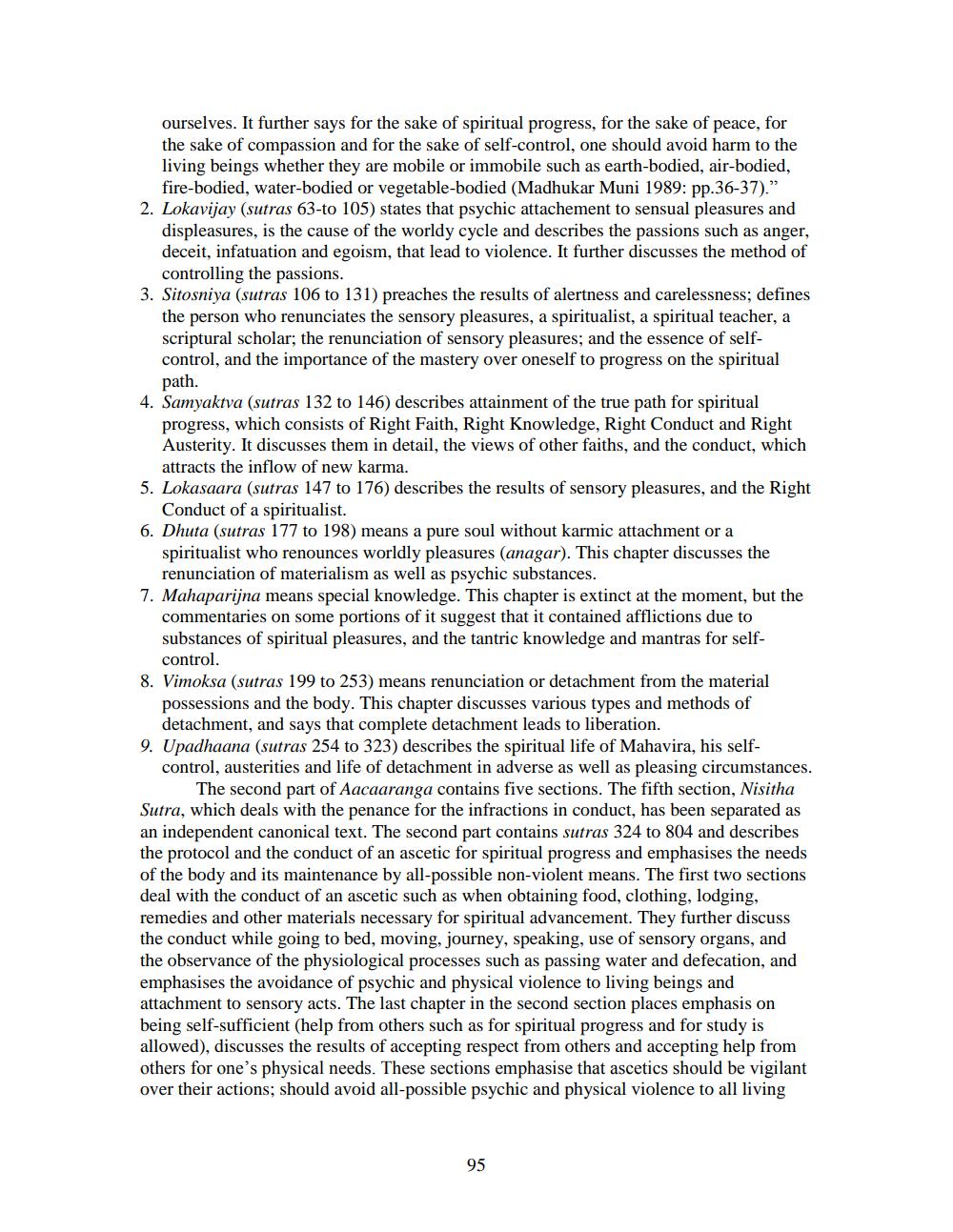________________
ourselves. It further says for the sake of spiritual progress, for the sake of peace, for the sake of compassion and for the sake of self-control, one should avoid harm to the living beings whether they are mobile or immobile such as earth-bodied, air-bodied,
fire-bodied, water-bodied or vegetable-bodied (Madhukar Muni 1989: pp.36-37)." 2. Lokavijay (sutras 63-to 105) states that psychic attachement to sensual pleasures and
displeasures, is the cause of the worldy cycle and describes the passions such as anger, deceit, infatuation and egoism, that lead to violence. It further discusses the method of
controlling the passions. 3. Sitosniya (sutras 106 to 131) preaches the results of alertness and carelessness; defines
the person who renunciates the sensory pleasures, a spiritualist, a spiritual teacher, a scriptural scholar; the renunciation of sensory pleasures; and the essence of selfcontrol, and the importance of the mastery over oneself to progress on the spiritual
path. 4. Samyaktva (sutras 132 to 146) describes attainment of the true path for spiritual
progress, which consists of Right Faith, Right Knowledge, Right Conduct and Right Austerity. It discusses them in detail, the views of other faiths, and the conduct, which
attracts the inflow of new karma. 5. Lokasaara (sutras 147 to 176) describes the results of sensory pleasures, and the Right
Conduct of a spiritualist. 6. Dhuta (sutras 177 to 198) means a pure soul without karmic attachment or a
spiritualist who renounces worldly pleasures (anagar). This chapter discusses the
renunciation of materialism as well as psychic substances. 7. Mahaparijna means special knowledge. This chapter is extinct at the moment, but the
commentaries on some portions of it suggest that it contained afflictions due to substances of spiritual pleasures, and the tantric knowledge and mantras for self
control. 8. Vimoksa (sutras 199 to 253) means renunciation or detachment from the material
possessions and the body. This chapter discusses various types and methods of
detachment, and says that complete detachment leads to liberation. 9. Upadhaana (sutras 254 to 323) describes the spiritual life of Mahavira, his selfcontrol, austerities and life of detachment in adverse as well as pleasing circumstances.
The second part of Aacaaranga contains five sections. The fifth section, Nisitha Sutra, which deals with the penance for the infractions in conduct, has been separated as an independent canonical text. The second part contains sutras 324 to 804 and describes the protocol and the conduct of an ascetic for spiritual progress and emphasises the needs of the body and its maintenance by all-possible non-violent means. The first two sections deal with the conduct of an ascetic such as when obtaining food, clothing, lodging, remedies and other materials necessary for spiritual advancement. They further discuss the conduct while going to bed, moving, journey, speaking, use of sensory organs, and the observance of the physiological processes such as passing water and defecation, and emphasises the avoidance of psychic and physical violence to living beings and attachment to sensory acts. The last chapter in the second section places emphasis on being self-sufficient (help from others such as for spiritual progress and for study is allowed), discusses the results of accepting respect from others and accepting help from others for one's physical needs. These sections emphasise that ascetics should be vigilant over their actions; should avoid all-possible psychic and physical violence to all living
95




